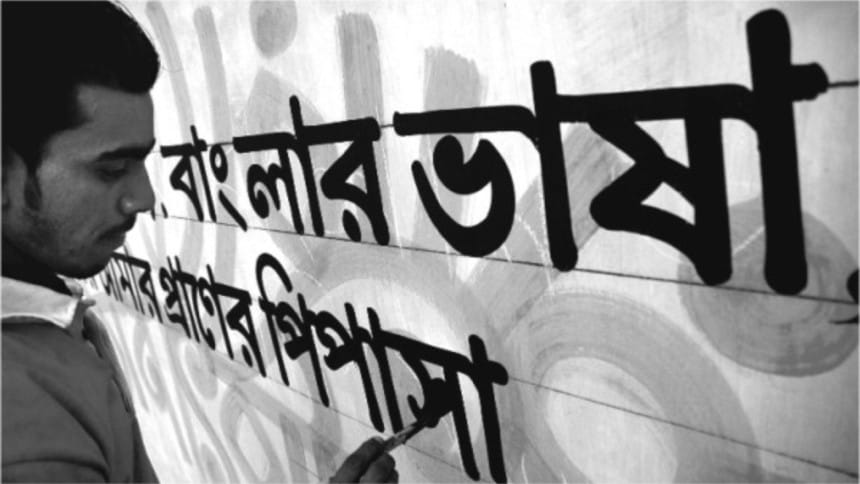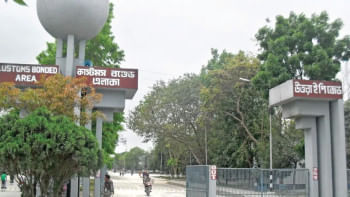Linguistic rights - Rhetoric v Reality

AS an emotional nation, the month of February reminds us the right to language. This right is recognised in the entire world but its protection is not guaranteed with the same gravity. Despite clear constitutional mandate subsequently backed up by a specialised law, the dignity and glory of Bangla language is on the wane.
Articles 3, 23 and 153 of the Bangladesh Constitution, 1972 envisages right to language, literature, culture and heritage. Section 3 of the Bangla Language Application Act (BLAA), 1987 obliges courts, government offices, semi-government and autonomous institutions except in foreign relations to use Bangla. Under section 137 of the Code of Civil Procedure, 1908 and section 558 of the Code of Criminal Procedure, 1898 Bangladesh government may issue Order making use of Bangla language mandatory in superior and subordinate judiciary. On June 7, 1988 the Eighth Amendment Act of the Constitution was enacted substituting the spelling 'Dacca' with 'Dhaka' and 'Bengali' with 'Bangla', but the later one has no tangible impact.
Bangla is used in the subordinate judiciary to a large extent but very minimal in the Supreme Court. The recognition of the mother tongue, as an aftermath of painstaking sacrifice is also ignored in the other government and non-government offices. Out of 81 private universities, only five universities have 'Bangla Literature' as a separate department undermining the concept of full-fledged university. Children in the Hill Tracts areas in Chittagong are deprived to use around 75 mother tongues in their educational institutions despite obligation under the laws including Parbatya Zilla Parishad Act, 1989 and the National Education Policy, 2010.
Around 1792, English entered into the field of education in India and about 1830 it became the de facto official language in the colonised territory. In 1991 Census, 1576 mother tongues were recognised and grouped into 114 languages in the country. The Indian constitution, 1950 declares Hindi and English as official languages, while Schedule VIII of the supreme document has recognised 22 state languages. The post apartheid South African Constitution, 1996 has recognised 11 state languages. There are nearly 6,500 languages in the world and out of which 5,000 indigenous languages are on the verge of extinction. The United Nations has officially recognised six languages while English and French are the working ones undermining the linguistic equality. Bangla turned as a state language of the then East Pakistan (Now Bangladesh) after a valiant sacrifice of leaders including Salam, Rafiq, Jabbar, Barkat in the language movement of 1952. As part of recognition of the martyrs, the 21st February is declared as the International Mother Language Day by the UNESCO in 1999.
Language has been a thriving stone behind astounding success for many countries including China, France, Japan, Korea, Russia, Spain, and Malaysia. Most of the people in these countries use their mother tongues as medium of instruction in education, office and personal dealings but do not hesitate to learn second language preferably English. They do not compromise with their own language while attunes the quote of Nelson Mandela that “if you talk to a man in a language he understands, that goes to his head and if you talk to him in his own language that goes to his heart.” Contrarily, European, Latin American and Arab universities are now switching to English language scaring the isolation and linguistic inability to face globalised competitors. Roman Empire might have been the cradle of the last great global language “Latin” but now their universities have embraced English as the medium of global business communication.
On February 16, 2012 Bangladesh Supreme Court in an order outlawed 'Banglish' the mixed use of Bangla and English at all levels terming the distortion of language “tantamount to rape” and instructing the government initiating efforts to protect Bangla having 1,000-year history. The court on February 17, 2014 directed the government to take steps to use Bangla in all advertisements of electronic media, signboards, personal name plates and registration plates of vehicles within a month submitting a compliance report within April 1 of 2014 but no change apparently. Previously, the apex court in Hasmat Ullah v Azmiri Bibi and Others [44 DLR (HCD) 1992] held that as the government did not declare any order under section 137(2) of the CPC of, 1908 and so in spite of enactment of the BLAA of 1987, the proceedings of the subordinate court could be continued in English. But in Eldridge v British Columbia, [1997] 3 S.C.R. 624, the Canadian SC ruled that sign language interpreters must be provided by doctors and other health care providers in the delivery of medical services to those having hearing impairments and doing so is necessary to ensure effective communication to avoid the risk of misdiagnosis and ineffective treatment.
So, rhetorically Bangla is getting recognition with meagre protection facing double whammy. The government should implement the existing laws adopting a timely language policy avoiding one sided emphasis on English only.
The writer is Assistant Professor of Law at Southeast University.

 For all latest news, follow The Daily Star's Google News channel.
For all latest news, follow The Daily Star's Google News channel. 



Comments